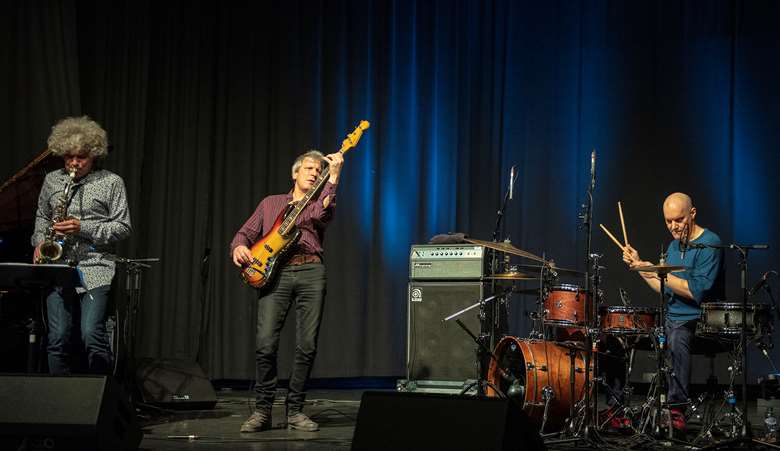Aka Moon energise Edinburgh’s Thrill: Jazz From Brussels
Thursday, February 14, 2019
There’s a new relationship in town, or rather, spanning two towns.

Last month, a trio of Edinburgh jazz players visited Brussels to form a collaborative combo with three Belgians, penning fresh music and performing at prime art deco-styled arts centre Flagey, located in the city’s Ixelles suburb. The return response has been somewhat more ambitious, involving a full-scale invasion of Brussels-based bands for a three-day festival in Edinburgh, with a clutch of local Scottish acts representing the indigenous talent. The Thrill weekender was presented by the Edinburgh Jazz & Blues Festival team, and on the Belgian front, represented by virtually every jazz-connected organisation in Brussels.
Three venues were used: Queen’s Hall, The Jazz Bar and Saint Bride’s Community Centre (a deconsecrated church), which made its full debut as a music joint during the festival. It was a successful transformation, with fine sound quality and a pleasing atmosphere. The weekend’s most arresting set came courtesy of veteran trio Aka Moon (pictured top) who are fast approaching their 30th anniversary. It had been almost a decade since many of the Belgian visitors had seen them play. This was a vital return, with electric bassist Michel Hatzigeorgiou being notably athletic with his resonant harmonics alternating with dub basslines. Alto-saxophonist Fabrizio Cassol spouted with fleet liquidity, while drummer Stéphane Galland emphasised the dub feel with his splashing rim-shots. Eastern modes prevailed, and the trio hurtled into a pacey funkster, with cycling alto and pneumatic drums, Hatzigeorgiou frequently intent on chording karate chops and nimble fingertip lines. Power entrails were ripped out of these convoluted compositions at hyperactive speeds.

At the same venue on the previous day, a well paired double-bill of like-minded Scottish and Belgian bands also happened to be led by drummers. The young Strata sextet (led by tunesmith Graham Costello, pictured above), boasted a strong connection between the heavy piano repeats of Fergus McCreadie and the searing, escalating tenor saxophone soloing of Harry Weir. The latter wandered off for a rest, a quiet trio section following, with the guitar eventually returning for increased atmospherics. McCreadie was ceaseless throughout the set, diligently exploring variations on a riff. He gave a dramatic solo, its giant gestures hiking into a guitar focus, Strata being influenced by a post-rock palette, but still keeping it calmed down into a jazz range, incarnated in a gentler mode.
Urbex followed, led by lively sticksman Antoine Pierre, but having trumpeter Jean-Paul Estiévenart as a major voice, whether muted tight or openly fiery. There was a strange similarity between the two bands, due to their shared interest in linear accumulations and increasing drive, along rhythmic paths. The Dutch guitarist Reinier Baas was outstanding, his sound toned down with an acoustic snap to his electrified strings, soloing and riffing with light cascades that held a subtle, contained and organic excitement. The jagged and twitching 'Consequences' was a fitting platform for the soloing skills of Baas.
The Django Reinhardt roots of Belgium were expressed by Les Violons de Bruxelles at Queen’s Hall on the opening night, with three fiddles and only one guitar. Their repertoire wasn’t dominated by gypsy jazz chestnuts, taking turns towards Jack Teagarden and W. C. Handy, or being influenced by Argentinian and Venezuelan traditions, but then alighting on Fapy Lafertin. This was a more refined acoustic affair when compared to the Mâäk Quintet down at The Jazz Bar, their four horns mostly working in entwined tandem, a riffing unit out of which individual solos rose up, then subsided, sousaphone continually belching, alto aerated, and metal percussion whipped out during the skeletal sections.
Multi-instrumentalist Esinam and the Ethio-psychedelic Echoes Of Zoo consolidated their successes at last month’s Brussels jazzfest, with the latter inviting Soweto Kinch up to guest on a number.
The somehow lower profile saxophonist Toine Thys was one of Thrill’s discoveries, even though he apparently has an established reputation in Belgium. It seems that Thys tours a lot around African parts, and his orientation towards the sounds of that continent made the guesting appearance of Salif Keita’s guitarist Hervé Samb an ideal choice. Toine doubled on low tenor and writhing soprano, aided by clipped or waltzing Hammond organ.
Regardless of future questions over whether Edinburgh has sufficient suitable acts for a comparable invasion of Brussels, on its own terms, this Thrill weekender managed to entice strong crowds for every set, as the Edinburgh audience were bountifully repaid for their curiosity about the Belgian scene.
– Martin Longley
– Photos by Marcin Pulawski